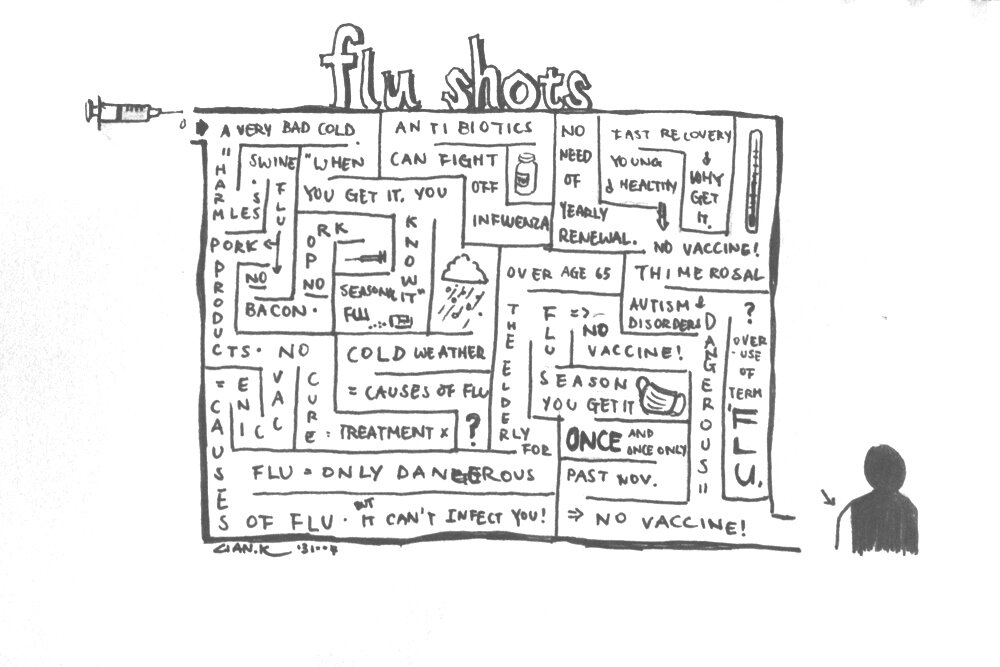Flu shot myths demystified: the truth behind the vaccine
As the flu season begins, so does the increased risk of becoming infected with the influenza virus. Fortunately, flu shots are widely available and grant you the necessary immunization. There are many myths regarding flu shots that many believe to still be true. Here is a breakdown of the most common debunked myths surrounding the flu shot.
Myth: The flu is harmless, like a cold, so it’s not worth getting a shot.
Fact: Influenza is much more serious than the common cold. While they share similar symptoms, like coughing and congestion, flu symptoms also include a high fever and body aches that many describe as feeling like having been hit by a truck. Influenza is a viral infection of the lungs and respiratory tract, so it’s especially threatening to young children, the elderly and those with chronic health conditions such as asthma. The virus affects 15 to 60 million Americans per year, hospitalizes 200,000 and is the cause of 3,000 to 49,000 deaths—more than twice the number of deaths caused by AIDS in America.
Myth: You can get the flu from the flu shot.
Fact: It is not possible to get the infectious form of the illness from a flu shot. The vaccine does contain a strain of the influenza virus, but it is attenuated (weakened) and thus is unable to cause the flu illness. The flu shot, however, may cause very mild flu-like symptoms for a short duration following the administration. The side effects include soreness and swelling at the site of injection and low grade fever and aches, all of which only last one to two days. Another reason that many people believe they contracted the flu following their immunization, is because the infection took place before the vaccine was able to take effect. It takes two weeks after being vaccinated for the body to build up complete immunity to that specific strain of the flu. Thus, there is a chance of contracting the virus during that two week window and people falsely blame it on the shot.
Myth: You don’t need to get a flu shot every year.
Fact: The influenza virus mutates and it is not unusual for a new strain of flu to develop each season. A new batch of vaccines need to be developed anually in order to protect against a new strain, so receiving a flu shot each year is highly recommended. Additionally, the shot’s immunity fades away after the season, so the protection will not carry over into the next flu season.
Myth: Healthy people don’t need to get a flu shot.
Fact: 20-30 percent of people carrying the flu virus have no symptoms, and thus assume that the are healthy. They spread the virus to others they come into contact with and potentially pose the risk of infection. So, even those who believe they are in a healthy condition should get a flu shot in order to help protect friends, family and even strangers who may be more susceptible to the virus.
Myth: I already had the flu so I don’t need a shot.
Fact: There is more than one strain of influenza in circulation each season. So Type A could have caused the infection, but there is still a risk of becoming infected by Type B. Flu shots include both Type A and Type B viruses, so it is a crucial safety measure to get the shot to ensure protection against all dominant strains.
Myth: It’s too late in the season to be vaccinated.
Fact: It’s never too late to get the flu vaccine as long as the viruses are still circulating. It’s recommended to get the flu shot immediately when they start becoming available in the beginning of Autumn, but it is still beneficial to get that protection well into the season. The flu season typically peaks in January and February and can run as late as May. It is not recommended to purposefully wait to get vaccinated late in the season since the immunity provided by a flu shot lasts the entirety of the flu season. It is safest to receive one as soon as possible to maximize protection.
If you are interested in getting a flu vaccine, the Pattie Groves Health Center on campus offers seasonal flu shots. Call to make an appointment.



